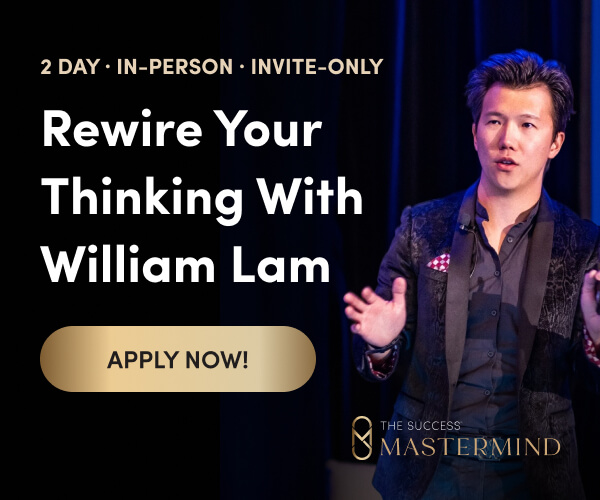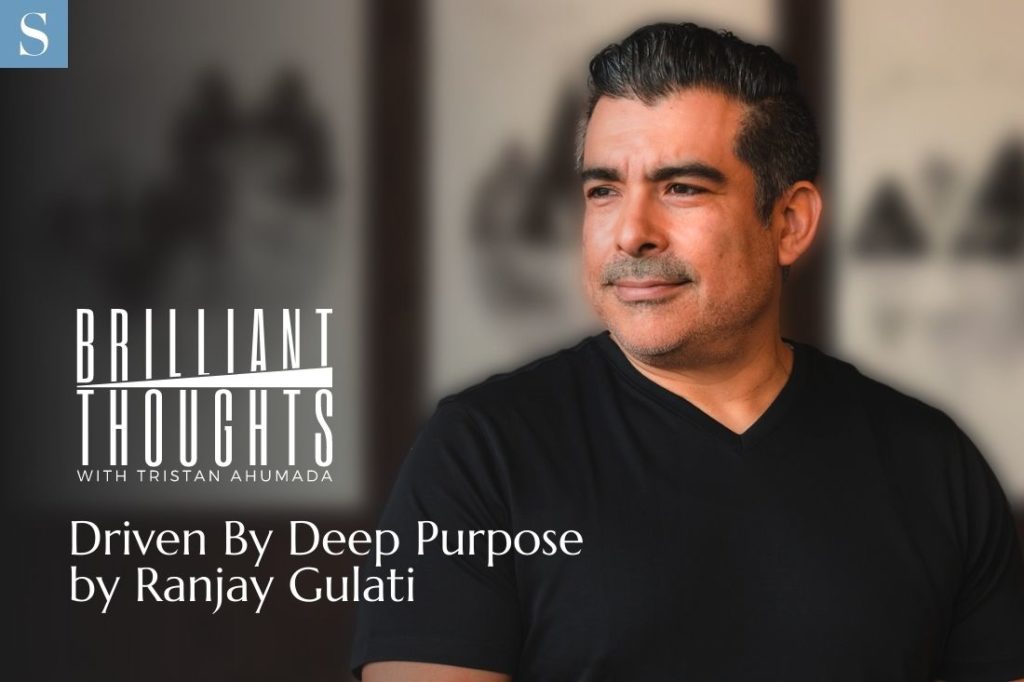Like many business experts, Harvard professor Ranjay Gulati has dedicated his life to understanding how companies grow. His conclusions, however, are by no means typical.
In his lifelong endeavor to understand the mechanics of business growth, Gulati found that the most successful companies share at least one key element: purpose. In his newest book, Deep Purpose, Gulati details why having prosocial goals is crucial to success, an idea he was initially hesitant to embrace.
“If you told me five years ago, ‘Ranjay, I have a crystal ball, and you are going to write a book about purpose,’ I would have said, ‘Tristan, you’re crazy,’” laughs Gulati in a recent conversation with Brilliant Thoughts’ host Tristan Ahumada. “Not a chance, zero, because to me this purpose stuff in business was like smoke and mirrors.”
Initially skeptical of companies that claimed to be driven by a desire to help others, Gulati found it hard to believe that businesses weren’t just virtue signaling. Now he understands that deep purpose not only exists within certain companies, but also plays a foundational role in their achievements.
What role should companies play in society?
When the Boston bombings happened in 2013, Gulati was teaching at Harvard. He felt it was necessary to talk about the event with his students, a conversation that ended up being the unlikely catalyst for his journey into purpose.
“We started a conversation about the tragedy, but then we turned into a conversation about the role of business in addressing more fundamental issues of society,” says Gulati. “To understand—what is the role of business and do businesses have a purpose?”
To answer his question, he went to his friend Larry Fink, an influential investor and the CEO of BlackRock, who was instrumental in many entrepreneurs’ adoption of meaning into their business frameworks. In talking with Fink, Gulati started to notice a trend: When small companies grew tremendously in size, their CEOs often expressed a lost sense of purpose.
With his interest piqued, Gulati started conducting interviews with CEOs and business leaders, thinking he would write some sort of expose. He discovered that within the context of a company, purpose can mean a variety of things. Yet, unlike how culture dictates a company’s dos and don’ts, purpose should serve to answer just one question: Why do we exist? Unfortunately, a company’s purported intentions aren’t always the reality.
Gulati divides purpose into three different categories: criminal activity, hobby and win-win. He uses the example of Theranos and Elizabeth Holmes to illustrate how greed can masquerade as altruism, and explains how other companies will only adopt purpose as a side hobby, not as part of the main business. The third type of purpose, win-win, is the intersection where a company finds a way to benefit society while still remaining profitable.
Purpose is essential to performance.
A company’s performance is crucial to its viability, but it shouldn’t be confused with purpose, although the two are largely inextricable.
“A lot of people talk about performance and purpose,” explains Gulati. “That ‘and’ word is highly confusing because when you put ‘and’ between the two, you’re implying that purpose is anything besides performance, it’s additive to performance.”
He says the right word to separate the two terms is ‘with’—performance with purpose. Every company needs to have a strategy based on the pertinent market variables, as well as a way to effectively implement that strategy. However, planning and implementing are difficult to do if you don’t have a foundational understanding of why your company exists.
Gulati describes purpose as a compass of sorts, an orienting framework that shows where a company is headed and why. It doesn’t need to be overly complex; it can simply outline a company’s goals and perceived duties to society. Purpose statements are useful in turning a set of words into an actionable goal.
Caring leadership offers a competitive advantage.
Researchers have long understood that people who feel like they have purpose live longer, happier lives than those who don’t. They are more productive at work, more inspired, more loyal and less likely to quit. Unfortunately, that’s not the experience that most workers in our society have.
“We have designed work in a way where we think of human beings as like a coin operated monkey,” says Gulati. “And I think in spite of 50 years of research showing that, yes, human beings want pay for performance… they want more than that.”
Although we tend to think of work as a necessary evil, Gulati says it doesn’t have to be that way. By aligning goals with the needs of its employees and consumers, businesses can create deep purpose organizations that benefit everyone, not just the stakeholders. He says these organizations are marked by at least two core principles: a profound sense of responsibility and a mutual trust between company and individual.
“To really unlock their personal purpose, you need to demonstrate that you care about not just them as a worker bee, but as a person,” he explains. “How am I going to help you live to your fullest potential, how am I going to establish that rapport of trust where you know that I have your well-being at heart?”
When entrepreneurs make it their mission to enhance the lives of their employees and consumers, they indirectly improve their company. The key is learning how to be supportive and challenging to their team at the same time, which takes practice. Although a boss’ support for their workers isn’t unconditional, it should have the same care and concern for well-being that marks any personal relationship.
“When you unlock purpose in somebody, you create inspired work,” concludes Gulati. Adding value to others’ lives continues to be one of the most mutually beneficial and constructive ways that entrepreneurs can improve individual lives, communities and the world.
Find Gulati’s work, including books, research and speaking events, by visiting his website. Reach out to him online via LinkedIn or Twitter.
Brilliant Thoughts with Tristan Ahumada is no longer releasing new episodes on the SUCCESS Podcast Network, but you can still listen to the full conversation below.












